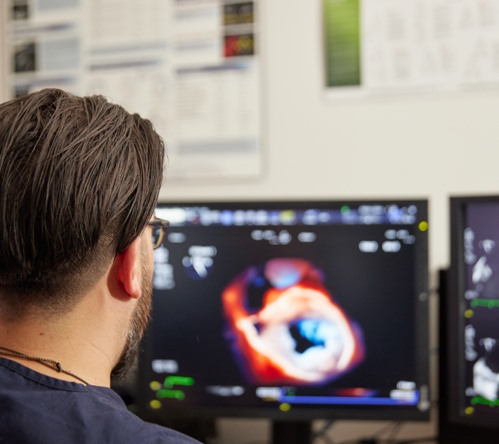Information about a test that evaluates the heart’s response to physical activity.
Duration
30 minutes (Exercise Stress ECG), 45 minutes (Exercise Stress Echo)
Fasting
Not Required
Medications
Please advise at the time of your booking if you are taking any beta-blockers (metoprolol, atenolol, bisoprolol, carvedilol or nebivolol) or calcium-channel blockers (verapamil or diltiazem). In most cases, your doctor will request that these medications be withheld for 48 hours prior to the test. You should be advised of this when you confirm your booking.
An exercise stress ECG / exercise stress echocardiogram involves performing graded exercise on a treadmill and if necessary very occasionally on a bike if a treadmill is not suitable. Your heart’s electrical activity, rhythm and blood pressure are monitored by a doctor and cardiac technician.

It is used to investigate for possible blockages of coronary (heart) arteries, to assess exercise capacity, and the hearts response to exercise. A technician will attach ECG leads to your chest, shoulders and back with sticky electrodes (sensors), and a blood pressure cuff to your arm.
The technician may need to shave and clean your skin with alcohol rubs to ensure a clear ECG recording. You will then be asked to exercise on the treadmill or bike for as long as you can or until the supervising Doctor ends the test. Most patients exercise for 5 to 10 minutes. At the end of the exercise you will be asked to lay down on a bed and recover while the Doctor continues to monitor the ECG and blood pressure readings.
The supervising Doctor prepares a report for the Cardiologist who will report the results to your referring Doctor.
An Exercise Stress Echo is the same test as an Exercise stress ECG with the addition of ultrasound assessment of your hearts pumping function. It is usually requested when an Exercise stress ECG will not yield sufficient information for your treating Doctors to make a diagnosis, or manage your symptoms/condition.
A Cardiac Sonographer will take images of your heart before commencing exercise and immediately after completion of exercise while your heart is racing. A Cardiologist will review the ultrasound images to assess how the pumping function of your heart has changed with exercise.
You will need to wear clothing items suitable to perform exercise.


